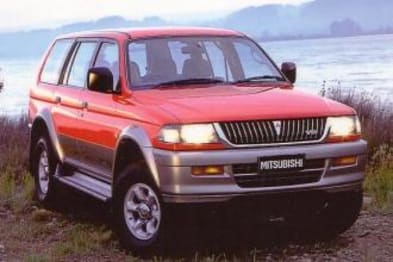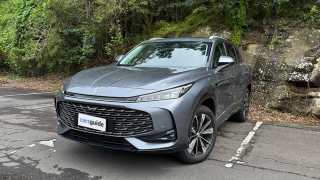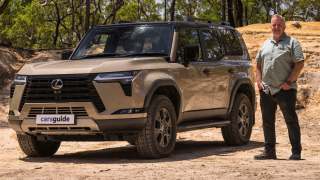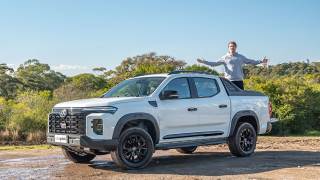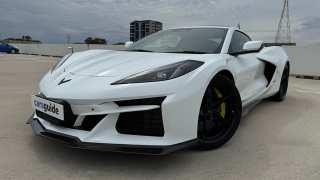
Used Mitsubishi Challenger review: 1998-2012
- Mitsubishi Challenger
- Mitsubishi Challenger 2010
- Mitsubishi Challenger 2011
- Mitsubishi Challenger 2012
- Mitsubishi Challenger 2006
- Mitsubishi Challenger 2007
- Mitsubishi Challenger 2009
- Mitsubishi Challenger 1998
- Mitsubishi Challenger 1999
- Mitsubishi Challenger 2000
- Mitsubishi Challenger 2001
- Mitsubishi Challenger 2002
- Mitsubishi Challenger 2003
- Mitsubishi Challenger 2004
- Mitsubishi Challenger 2005
- Mitsubishi Challenger Reviews
- Mitsubishi Reviews
- Mitsubishi SUV Range
- SUV
- Mitsubishi
- Used Car Reviews
- Family Cars
- 7 seater
- Buying tips

When introduced to Australia in 1998, the Mitsubishi Challenger was virtually a Triton pickup fitted with a station wagon body. Over the years it retained parts in common with the Triton but became more sophisticated.
Challenger is slightly smaller and less passenger oriented vehicle than selling Mitsubishi Pajero. This makes it significantly cheaper. Many 4WD enthusiasts say the Challenger is closer to being a ‘real’ 4WD than the Pajero, and love it for that.
Take it to forest trails and it will cope with ease, likewise it handles beach driving well. Having said that, a well driven Pajero can be pretty handy off-road as well. From mid 2007 until December 2009 no new Challengers were built.
That’s because the engineers concentrated on designing the all-new Triton (the one with the interesting shape at the rear of the doors) before starting to expand their efforts onto the Challenger. Mitsubishi Challenger was a five-seater until the all-new model of 2009 when a seven-seat option was offered.
All Challengers have good head and legroom but the older models are a bit cramped for width in the back for three big adults. Luggage space is excellent in the five-seater, with plenty of length and width. Naturally, the seven-seat models lose space in the rear, but are still pretty good.
The area is quite easy to load despite being high off the ground. There is also plenty of in-cabin storage space. The Challenger has reasonable on-road comfort for its type and most owners are happy with its characteristics. Later models improved in this.
However, those looking for a very relaxed suburban ride may be better off opting for Pajero instead. The Mitsubishi Challenger’s engine is either a 3.0-litre petrol V6 unit or a four-cylinder 2.5-litre turbo-diesel. The petrol engine is willing enough, but is slightly down on torque at everyday revs.
So you have to work at gearchanging to keep it working to best advantage. The five-speed manual gearbox is light and easy to use. The automatic transmission used prior to 2009 is a four-speed unit, then moved up to five-speed unit with the all-new 2009. The auto has Mitsubishi’s semi-intelligent change system and can be used as a sequential manual.
The Challenger’ doesn’t use the highly-regarded Super Select 4WD system fitted to the Mitsubishi Pajero, rather it has an old-style setup which normally drives the rear wheels only. The two-speed transfer case can be shifted on-the-fly between 2H and 4H at speeds of up to 100 km/h and the front hubs are automatic.
So, apart from the inability to use 4WD on sealed roads the system is almost as good as the Super Select one. Though some see this setup as being old-fashioned it explains part of the aforementioned appeal to buyers looking for a ‘real’ 4WD.
The suspension in the original ute-based model has a very firm ride that can make the Challenger tiring on a long trip. Mitsubishi made major revisions to the suspension as part of the mid-2000 facelift and mechanical makeover. The 2009 Triton is much more civilised in the comfort department.
Spare parts availability is good and we have heard of no complaints about pricing. Mitsubishi is long established in Australia, having built cars in its Adelaide factory for many years, so is well represented in most areas. Even when you’re deep into the outback there’s a good chance you can find parts and a mechanic who understands the Challenger.
Insurance is generally at the lower end as it’s the sort of vehicle that normally sells to conservative people.
WHAT TO LOOK FOR
If you suspect the Mitsubishi Challenger has had a lot of use on dirt roads and in off-road conditions make a careful check of the interior fittings as the firm suspension can eventually cause squeaks and rattles.
Look over the cabin for signs of rough usage, being sure to look into all the hidden storage areas for damage that may have been caused by bored junior travellers. At the same time check out the luggage area for damage and/or bad staining.
While the Challenger was built down to a price, quality certainly didn’t suffer and there's the typically impressive Japanese attention to detail. Look under the Challenger’s body for signs of damage caused by too-hard driving in harsh areas. Also look and taste for salt on the chassis rails.
Salt can really attack steel and frequent beach use can cause corrosion to rip into the metal if it’s left unchecked. Make sure that the Mitsubishi’s engine starts easily and idles smoothly as soon as it settles into its rhythm.
Check the engine doesn't blow any exhaust smoke when accelerated hard, especially after it's been idling for a while. It if does it could be due for an expensive overhaul. Be sure that all gearchanges are smooth and light. Check that 4WD is engaged in both high and low ratios without too much effort.
CAR BUYING TIP
Don’t even think of handing over your hard earned until you've had a full professional inspection, preferably from an expert on the make/model you’re considering.
Pricing
| Year | Price From | Price To |
|---|---|---|
| 2012 | $8,250 | $21,340 |
| 2011 | $7,590 | $20,130 |
| 2010 | $10,560 | $19,250 |
| 2009 | $9,790 | $17,710 |
| 2007 | $3,080 | $5,830 |
| 2006 | $2,860 | $5,390 |
| 2005 | $2,860 | $5,940 |
| 2004 | $3,410 | $7,260 |
| 2003 | $3,300 | $9,240 |
| 2002 | $3,080 | $9,240 |
| 2001 | $3,300 | $5,940 |
| 2000 | $3,300 | $5,940 |
| 1999 | $3,300 | $5,390 |
| 1998 | $3,300 | $5,390 |
Pricing guides
Range and Specs
| Vehicle | Specs | Price* | |
|---|---|---|---|
| (4X4) | 3.0L, ULP, 4 SP AUTO 4X4 | $3,410 – 5,390 | 1998 Mitsubishi Challenger 1998 (4X4) Pricing and Specs |
$2,970
Lowest price, based on third party pricing data



